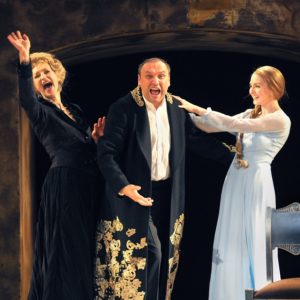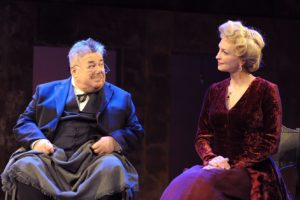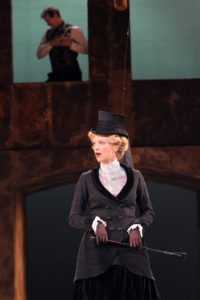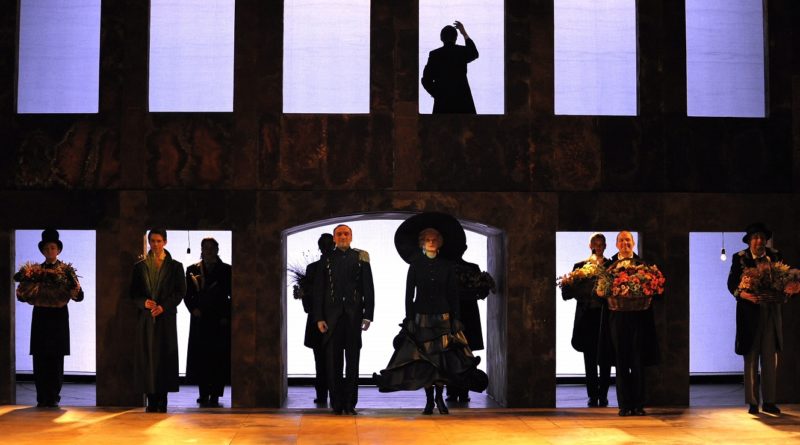Bribery, lust and appetite at the edge of the Russian Empire: The Government Inspector by Nikolai Gogol
The Teatro Argentina in Rome presented on 14 and 15 September the play The Government Inspector, a masterpiece by the Russian author and dramatist of Ukrainian origin Nikolai Gogol. The staging proposed by the Georgian director Robert Sturua, who chose the famous Russian actor Aleksandr Kalyagin for the main role of Khlestakov, appears as a successful synthesis of different genres, among which the Commedia dell’arte à la russe stands out.
This humorous play, also know in English as The Inspector General (the original title is Ревизор, Revizor), tells of a group of corrupt small town officials who got a tip-off that a government inspector is coming from St. Petersburg to town incognito. The play is not only a biting satire of public corruption in Tsarist Russia, but is an example of how Gogol was both obsessed with and delighted by food. In his works one can notice a widespread presence of food and drink, especially in The Government Inspector. The scholar Ronald D. Leblanc describes the main character of Ivan Khlestakov as a hedonistic layer. The complacency of the old Khlestakov, the grotesque misunderstandings on the stage and the sense of guilt for the mismanagement of public affairs on the part of the Mayor and his inner circle make Khlestakov mistaken for the inspector sent from St. Petersburg to check the finances of the un-named far away town from the Russian capital.


The Gogolian theatre succeeds in making a breach in the heart of the contemporary spectator, because its comic timing is as an effective means of correcting, removing, modifying pettiness and hypocrisy from the human soul. Huger represents in The Government Inspector also the bitter deprivation of poor people, like Osip, Khlestanov’s servant, who resembles to a heroe of the Spanish picaresque tradition, whereas Khlestanov’s appetite is a delight.

The Government Inspector may be read as social comedy (Gogol’s 1836 reading) and as a kind of metaphysical comedy centered on the radical imperfection of human nature (his 1846 revision). It mocks the way of the world but its mockery is part of an effort to obliterate the world as a prelude to final judgment.
The play is rather a metaphor of the daily suffering of the human spirit than a satire or a farce. Gogol’s view on bureaucracy, politics and human foibles is still appropriate for today and reveals to the audience that in a society based on absolute power everybody brings, like it or not, his contribution to the corrupt system.
________________________________________________________________________________
THE GOVERNMENT INSPECTOR. A VERSION
by Nikolai Gogol
directed by Robert Sturua
with Aleksandr Kalyagin (Ivan Khlestakov, the inspector from Petersburg)
and with (in alphabetical order) Fëdor Bavtrikov (Petr Ivanovich Bobchinski, the local landowner),
Nataliya Blagich (Anna Andreevna, wife of the Mayor),
Artem Blinov (Artemy Filippovich Zemlyanika, the curator of religious institutions),
Timofey Dunaev (Christian Ivanovich Hybner), Cristina Gagua (Marya Antonovna, daughter of the Mayor),
Andrej Kondakov (Petr Ivanovich Dobchinski, the local landowner),
Ivan Kosichkin (Luca Lukic Hlopov, the superintendent of schools), Kirill Loskutov (The owner of the restaurant), Elizaveta Ryzhich (Avdotia), Evgeny Shevchenko (Ivan Kuzmic, Shpekin, the postmaster),
Vladimir Skvorcov (Anton Antonovich Skvoznik-Dmuhanovsky, “gorodnichiy” the Mayor),
Grigory Starostin (Osip, his servant), Sergey Tongur (Ammos Fyodorovich Lyapkin-Tyapkin, the judge),
Aleksandr Zhogol (merchant)
Design Aleksandr Borovsky – Lights Andrey Abramov – Choreographies Konstantin Mishin
music by Giya Kancheli, Giuseppe Verdi, Franz Schubert, Duke Ellington, Astor Piazzolla, Krzysztof Penderecki
Production Theatre ET CETERA, Moscow
Photos and video: Courtesy of Teatro di Roma




